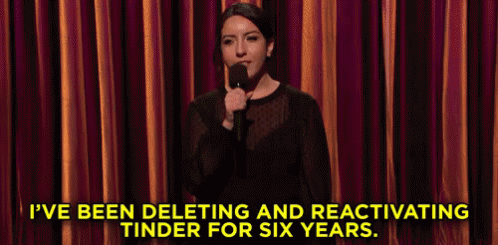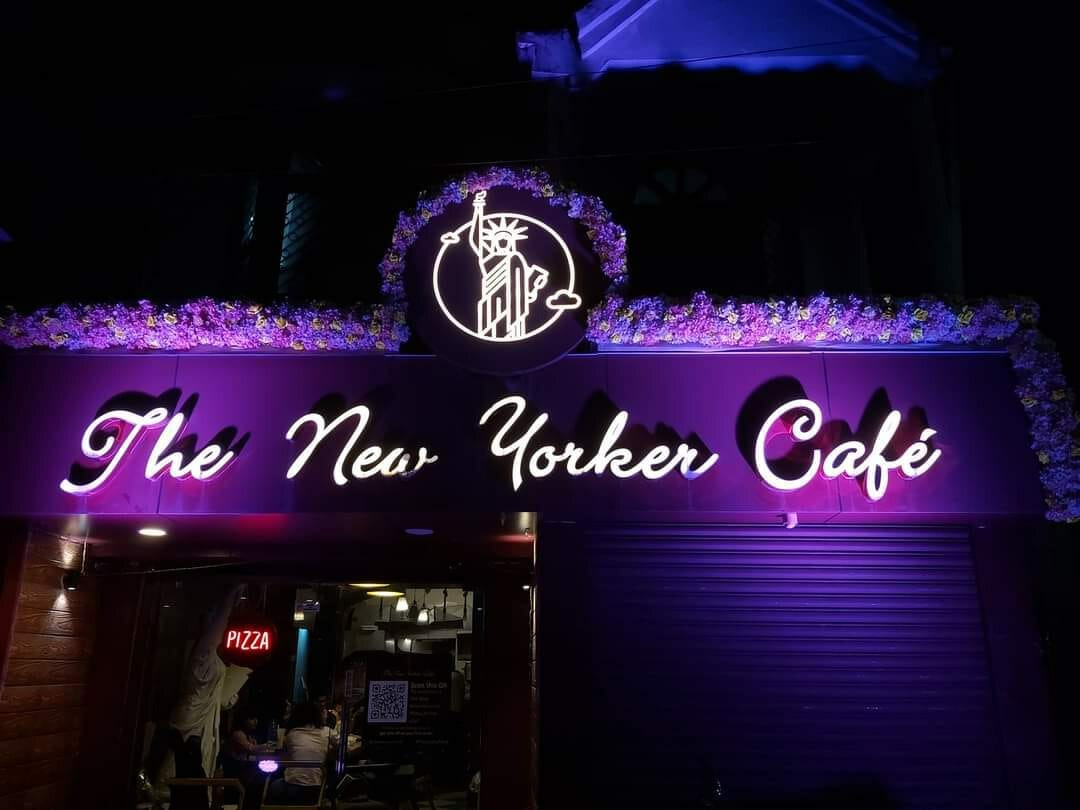Tinder is coming to town
Dating apps are helping youth connect in small towns and reviving small businesses
Good Morning! A big hello to readers who signed up this week. This is The Signal’s weekend edition. Our story today is about how dating apps are not only catching on in small towns but also helping hyper-local economic revival in a small way. Also in today’s edition: the best reads from the week. Happy weekend reading.

As the city of Jabalpur slips into its customary siesta, The New Yorker comes alive with giggly whispers of young couples. The small New York-themed café, complete with a statue of Lady Liberty and New York skyline wallpaper, is a favourite haunt of youngsters yearning for the carefree vibe of the big city in a small town.
“A lot of people come to our café for their first date,” says Shubhansh Gupta, the owner of New Yorker, told The Intersection. Gupta’s café is a sanctuary for couples who match up on dating apps such as Tinder, Bumble, and Happn.
Dating is a relatively new concept in India. According to the 2018 Lok Foundation-Oxford University surveys, over 90% of young Indians had an arranged marriage. Those getting married after falling in love were only 3%. While metropolitan cities like Delhi and Mumbai are quickly exposed to the ideas of the “West”, these have been slow to travel to smaller cities where free-flowing conversations about sex and love stall at morality checks. The pandemic, however, is helping bridge the dating divide between cities faster as many youngsters, especially women, returned to their hometowns, bringing with them big city mores and ambition. High-speed Internet, slick shows on streaming platforms, and companies following workers home rather than pulling them to offices have also fuelled the trend.
Privacy in public
Ahmed* says he can’t date a lot in his home city Aligarh. “If any girl comes on Bumble,” he says, “everyone finds out.” The only real opportunity he gets is when people who have migrated to bigger cities return to meet their families, something that happened during the pandemic. “If they are using the app while in Aligarh, I have an opportunity to meet someone.” Keshav*, who lives in Bhubaneswar, says he’s met a lot of people returning from metros.
It’s the same in Jabalpur. Akash*, who lives there, says of the 26 women on the app, only two have liked him back. “Unless there are big-city dwellers who are visiting, there is no such dating opportunity.” The lack of dating infrastructure only adds to their problems. Where will you meet where you can protect yourself from the prying eyes of people and enjoy some personal time?
Mushrooming cafés and rent-a-room apps help find private spaces and are integral to the dating economy that is developing in small towns. Even the names of restaurants, Brewberrys and Bocca in Bhubaneswar and New Yorker in Jabalpur, and their menus hint at a certain aspiration. A person used to the chic joints of Mumbai’s Bandra may not exactly feel at home here, but they certainly sound modern and serve more global fare than dhabas and old-time restaurants called Swastik and Sonali. Pizzas, tacos, and Thai curry, for instance.
The manager of Bocca café insists all kinds of people, including couples, visit the place, but the Brewberrys’ manager says couples are the bread and butter of its business. Jabalpur alone has over 50 cafés now, and a majority of them have sprouted in the past few years. New Yorker’s Gupta even decorates the café and organizes music, cake, and flowers for couples celebrating their dating milestones.

The need for love and companionship became acute during the pandemic as governments blocked travel and slammed cities shut, confining people to their homes for months. According to Tinder’s Future of Dating report, users engaged in conversations 32% longer during February 2021 compared to February 2020. The app also saw 11% more swipes and 42% more matches per member.
India, it seemed, was waiting for Tinder when it arrived in 2013. Within two years, usage went up 400%. India is now the second-biggest market by revenue for dating apps after the US. They collectively generated $323 million in revenue in India in 2020, according to Statista.com. Tinder has grown twice as much in Tier-II cities than metros in the past year. Over 33% of people grapple with loneliness on a daily basis globally. In India, the numbers are as high as 43-46%, a Statista report says.
Naina Hiranandani, the chief operating officer of Sirf Coffee, a high-end hybrid dating service, says the company now has a growing number of clients from cities such as Nagpur, Lucknow, Kanpur, Jaipur, and more.
Sirf Coffee, unlike regular dating apps, caters to a market where people are looking for long-term relationships and marriage. Hiranandani says a lot of people are looking for love and don’t want to get married in the old-fashioned way.
Thirty-five-year-old Lucknow resident Vandita*, who wants to find companionship on her own terms, has been using dating apps almost from the time Tinder launched in India. But she has been disappointed. “The dating pool is very limited,” she says. When Vandita had first joined Tinder, she was told that women found on “such apps” don’t get married. “Everyone thinks we are here just for sex.” To be sure, the Future of Dating report revealed that nearly 62% of singles weren’t looking for a committed relationship and preferred friendship with romantic potential or casual dating.
The scene could get livelier, as more big companies create employment locally even if they do not have offices in these locations.
Times are changing
Apps such as Grindr and Bumble also allow queer people to find each other in a sea of unknown, and sometimes hostile, faces. Tinder launched ‘Queer Made’ in July to celebrate, support, and amplify businesses, products, and services from the LGBTQIA+ community.
Despite the decriminalization of Section 377, India has been slow to accept queer love. Here, dating apps have increased their chances of finding companionship. This too, however, has not been without problems. There have been several cases of catfishing, fraud, and extortion. Almost every queer person The Intersection spoke to shared a story of assault. Sia*, a trans person from Kalyan, says they never meet anyone in Kalyan but have dated in all nearby cities.
The cultural cauldron of dating is warming in India’s small towns. So is the market. According to a Statista report, the number of dating app users in India is estimated to be 165.6 million by 2025, a large chunk of which will come from small towns.
Dating infrastructure does not exist in tier-III cities like Murshidabad. But lovers are also consumers, and businesses sprout in unexpected places. The Ganga Ghats, for instance. Shrishti*, one of the Bumble users in the Bengal city, says she has noticed an influx of small tea and coffee stalls opening up on the steps. The stalls that offer samosa, kachori, tea, and coffee cater to the couples snuggling by the ghats. Their business, she says, has visibly multiplied. With the absence of safe, café-like spaces in the city, it is such public places that are hosting the youth. While Murshidabad remains largely conservative, she sees the growing usage of dating apps and small businesses as a sign of better tidings.
*Names have been changed at the request of the interviewees.
Sponsored by CTQCompounds
Ever thought of rediscovering your reading habit? Or feared that your skills might become obsolete in a fast-changing world?Head over to CTQCompounds.com for the Daily Reader program. New batches start every month. They also have FutureStack that keeps you up to date with ideas, skills & mental models that will help you stay prepped for the future. FutureStack batches start every Saturday. Also check out their Social Capital Compound to master social media. So head on over to CTQCompounds.com and uplevel yourself. You owe this to yourself.
We have added a discount code SIGNAL2500 for the Daily Reader, FutureStack, Social Capital products which will give a discount of Rs. 2500/- The links above have the discount code applied already.
ICYMI

Ex-Gangster Professional: In Japan, former Yakuza crime gang members are now turning to salaried jobs. This is after a heavy crackdown by the country’s government. These ex-criminals are now chefs, real estate agents, and even restaurateurs.
Not So Secret: Once a go-to brand, lingerie giant Victoria’s Secret had a quick fall from grace. This podcast explores the fall of the lingerie brand including its toxic work culture, exploitation of its models, and the infamous association with sex offender Jeffrey Epstein.
Master of All? Guitar lessons by Metallica sound too good to be true, right? Well, the heavy metal band is giving lessons on the e-learning platform MasterClass. This piece in The New Yorker explores the success story of MasterClass and the debate around whether just a few hours are adequate to get upskilled.
Resignation Era: ‘We can do better’ is the attitude at American workplaces. Better wages, rent moratoriums, and pandemic payouts have accelerated the decision to quit jobs among US workers, says this The Atlantic story. Employees no longer want to adjust.
Hedge Fund Media: Chicago-based newspaper chain Tribune Publishing was a profitable entity. Then ‘vulture’ hedge fund Alden Capital acquired the venture, implemented layoffs, and is cutting costs at every junction. This media entity may soon be extinct.
Anti-Nazi Saviour: Remember Oskar Schindler from Schindler’s List? There is another such personality. This deep-dive tells the story of how Portuguese diplomat Aristides de Sousa Mendes disobeyed his government and saved thousands from Hitler’s Nazi regime.



